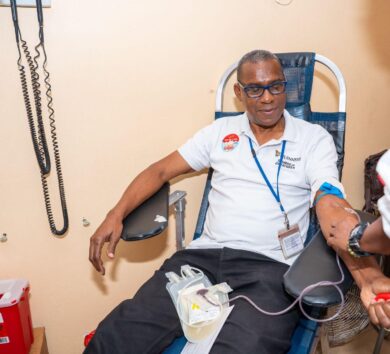

The island’s current fully vaccinated rate of 20.2 per cent, begs the question of whether or not members of the public are aware of the properties these vaccines hold.
Having disposed of hundreds of vaccine doses in the past, the Ministry of Health and Wellness may stand to once again be forced to dispose of another batch of expired vaccines, which, arguably, may be partially due to the nation’s ignorance.
Our Today, in this ‘need-to-know’ series on the different COVID vaccines available on the island, today focuses on the AstraZeneca vaccine, utilising information from the World Health Organisation (WHO).
AstraZeneca
Who created the vaccine?

The AstraZeneca vaccine was developed in the United Kingdom by the Oxford University and British–Swedish company AstraZeneca, in June of 2020.
This viral vector based vaccine contains ethanol, sodium chloride, L-histidine, L-histidine hydrochloride monohydrate, disodium edetate dihydrate and sucrose.
Who can take the vaccine?
Those who suffer from the comorbidities including obesity, diabetes, respiratory disease and cardiovascular diseases, are encouraged to take the vaccine, as these diseases increase one’s risk of suffering from the severe COVID-19 illness.
Those who have had COVID and those 18 years and older are also able to be administered the vaccine. WHO recommends the use of the COVID-19 vaccine in pregnant women only if the benefits of vaccination to the pregnant woman outweigh the potential risks.
Additionally vaccination can be offered to breastfeeding women if they are a part of a group prioritised for vaccination.
Who is the vaccine not recommended for?

According to the World Health Organization, those with an allergic reaction to any component of the vaccine should refrain from taking it.
Pending further results, WHO currently recommends that the vaccine not be administered to those under 18 years of age.
What is the recommended dosage?
Two doses of AstraZeneca vaccine have been approved, with an interval of eight to 12 weeks.
Can this vaccine be ‘mixed and matched’ with other vaccines?
If product availability becomes an issue, the Pfizer vaccine can be taken as the second dose to complete the primary series of vaccination.
Similarly, dependent on product availability, the AstraZeneca vaccine can be issued as the second dose, subsequent to taking the inactived Sinopharm vaccine.
Side Effects?

Side effects are quite common after being vaccinated, and may last for a few hours to a few days.
Redness, soreness and swelling may be experienced at the injection site. General symptoms include joint pain, fatigue, chills, headache, mild fever, muscle aches.
In rare cases, one may experience blood clots, capillary leak syndrome and Guillain-Barré syndrome. In the event that one experiences a severe allergic reaction which includes hives, unconsciousness, sudden low blood pressure, vomiting, difficulty breathing, diarrhea, increased heart rate or abdominal pain, visit the nearest clinic or see your doctor immediately.
How efficacious is the vaccine?
At present the vaccine efficacy for those symptomatic stands at 76 per cent.
Does it work against new variants?
The WHO Strategic Advisory Group of Experts on Immunisation (SAGE), recommends its use for variants of concern. However, at present, there is no data to show the AstraZeneca vaccine is effective against the most recent variant of concern, Omicron.







Comments